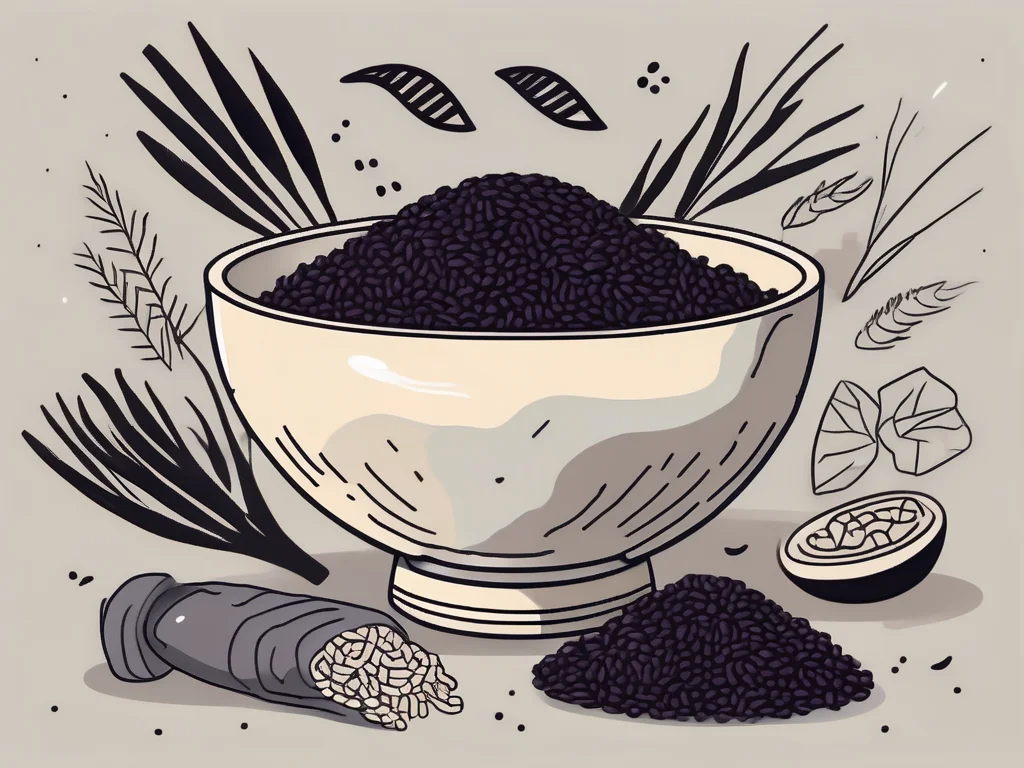Black rice, often called forbidden rice, is a nutrient-dense grain celebrated for its striking color, unique flavor, and impressive health benefits. Once reserved for royalty, this ancient grain has become a modern superfood. In this blog, we’ll explore the key benefits of eating black rice, its nutritional profile, and how to incorporate it into your diet, all while addressing potential side effects and dietary considerations. With a focus on concise information, let’s dive into why black rice deserves a place in your meals.
What Is Black Rice and Why Is It Special?
Black rice, historically known as forbidden rice, was once exclusive to Chinese royalty due to its rarity and nutritional value. Its deep black or purple hue comes from anthocyanins, powerful antioxidants that give it both its color and health-boosting properties. Unlike white or brown rice, black rice offers a unique combination of flavor, texture, and nutrition, making it a standout choice for health-conscious eaters.
What Are the Nutritional Benefits of Black Rice?
Black rice is a nutritional powerhouse, offering a range of essential nutrients that surpass those found in other rice varieties. Here’s a breakdown of its key components:
- High Fiber Content: Supports digestion, promotes satiety, and helps regulate blood sugar levels.
- Rich in Antioxidants: Contains anthocyanins, which combat oxidative stress and reduce inflammation.
- Essential Minerals: Provides iron for oxygen transport and magnesium for heart and muscle health.
- Low Glycemic Index: Prevents blood sugar spikes, aiding in weight management and energy stability.
These nutrients make black rice a versatile addition to a balanced diet, offering both immediate and long-term health benefits.
How Does Black Rice Support Heart Health?
Black rice is a heart-healthy grain thanks to its antioxidant and nutrient profile. The anthocyanins in black rice help reduce cholesterol levels and prevent plaque buildup in arteries, lowering the risk of heart disease. Additionally, its magnesium content supports healthy blood pressure and heart rhythm.
Studies suggest that regular consumption of anthocyanin-rich foods like black rice can improve cardiovascular health by reducing oxidative stress and inflammation. Incorporating black rice into your meals is a delicious way to support your heart.
Can Black Rice Improve Digestive Health?
Yes, black rice is an excellent source of dietary fiber, which promotes healthy digestion. Fiber aids in regular bowel movements, prevents constipation, and supports a balanced gut microbiome by acting as a prebiotic. This means it fuels beneficial gut bacteria, leading to better nutrient absorption and reduced gastrointestinal issues.
By including black rice in your diet, you can maintain a healthy digestive system while enjoying its nutty flavor and chewy texture.
Does Black Rice Help with Weight Management?
Black rice can be a valuable ally in weight management. Its high fiber content promotes feelings of fullness, reducing the urge to overeat or snack excessively. Additionally, its low glycemic index helps stabilize blood sugar levels, preventing cravings caused by sudden spikes and crashes.
By incorporating black rice into meals, you can support healthy eating habits and maintain steady energy levels throughout the day, making it easier to achieve your weight goals.
How Do Antioxidants in Black Rice Benefit Health?
The antioxidants in black rice, particularly anthocyanins, play a crucial role in protecting the body from oxidative stress. These compounds neutralize free radicals, which can cause cellular damage and increase the risk of chronic diseases like cancer and heart disease. Anthocyanins also have anti-inflammatory properties, supporting immune function and overall resilience.
Additionally, black rice contains phytonutrients like flavonoids, which further enhance its antioxidant capacity. Regular consumption may reduce inflammation, boost immunity, and lower disease risk.
How Can You Incorporate Black Rice into Your Diet?
Adding black rice to your meals is simple and versatile. Its nutty flavor and firm texture make it a great addition to both savory and sweet dishes. Here are some practical ways to enjoy it:
- Cooking Black Rice: Rinse thoroughly, then cook using a 2:1 water-to-rice ratio on the stovetop or in a rice cooker for 30-40 minutes.
- Recipe Ideas:
- Black Rice Salad: Combine with vegetables, herbs, and a light vinaigrette for a refreshing dish.
- Stir-Fries: Use as a base for colorful veggie and protein-packed stir-fries.
- Black Rice Pudding: Mix with coconut milk and fruit for a healthy dessert.
- Sushi or Pilafs: Substitute black rice for a nutrient-packed twist on classic recipes.
Experiment with black rice to add variety and nutrition to your meals.
Are There Any Side Effects of Eating Black Rice?
While black rice is generally safe, some individuals may experience allergies or intolerances. Rice allergies, though rare, can cause symptoms like hives, itching, swelling, or digestive discomfort. If you notice adverse reactions, stop consuming black rice and consult a healthcare professional.
Additionally, black rice should be part of a balanced diet. Relying solely on it may lead to nutrient deficiencies, so pair it with a variety of fruits, vegetables, proteins, and healthy fats for optimal nutrition.
Is Black Rice Worth Adding to Your Diet?
Absolutely, black rice is a nutrient-rich grain with a host of health benefits. Its antioxidant properties, high fiber content, and essential minerals make it a valuable addition to any diet. From supporting heart health and digestion to aiding weight management, black rice offers both flavor and function. Its versatility in recipes, from salads to desserts, makes it easy to incorporate into your meals.
However, listen to your body and consult a healthcare provider if you have specific health concerns. With its unique blend of taste and nutrition, black rice is a superfood worth exploring.
Conclusion: Embrace the Power of Black Rice
Black rice, with its rich history and impressive nutritional profile, is more than just a trendy grain. Its antioxidant-packed, fiber-rich nature supports heart health, digestion, weight management, and overall well-being. Whether you’re tossing it into a salad, stirring it into a savory dish, or creating a sweet treat, black rice adds both flavor and nutrition to your plate. Try this ancient grain today and unlock its potential for a healthier you.



